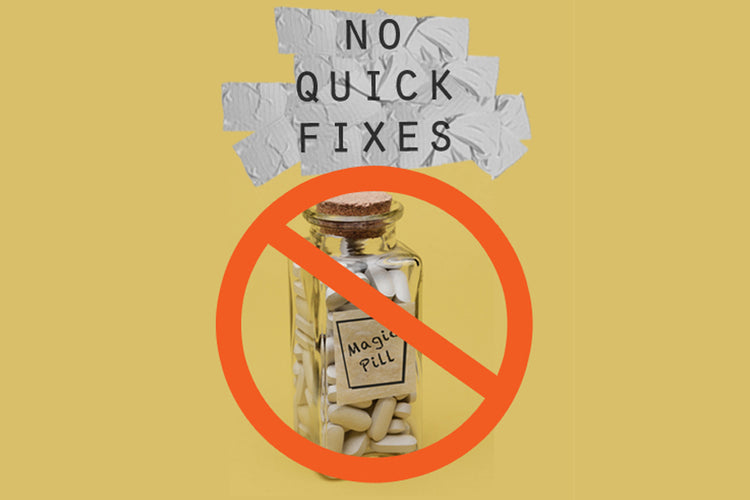Polycystic Ovary Syndrome (PCOS) is a common hormonal disorder that affects millions of women worldwide.
Characterized by irregular periods, excessive hair growth, acne, and weight gain, PCOS is a complex condition that can impact various aspects of a woman's life, including her self-esteem and overall well-being. One of the most distressing symptoms associated with PCOS is the accumulation of belly fat, commonly called "PCOS belly."
It is essential to understand that PCOS-related belly fat is more than just a cosmetic concern; it can contribute to various health issues, such as insulin resistance, type 2 diabetes, cardiovascular disease, and increased risk of certain cancers. Addressing the issue of PCOS belly fat will help you achieve a more desirable body shape and contribute to overall health improvements.
This blog post will discuss the connection between PCOS and belly fat and outline five easy and effective ways to reduce it.
If you want to understand more about PCOS Natalie Crowford MD has a whole YouTube channel dedicated to educating about this. Here is a video to get started!
Understanding PCOS Belly
Polycystic Ovary Syndrome (PCOS) is a hormonal disorder that affects approximately 1 in 10 women of reproductive age. It is characterized by an imbalance of hormones, including insulin and androgens, leading to various symptoms, such as irregular periods, acne, and excessive hair growth. One of the most common and noticeable symptoms is weight gain, specifically in the abdominal region, known as PCOS belly.
The weight gain and belly fat accumulation in PCOS can be attributed to insulin resistance. In this condition, the body's cells do not respond effectively to insulin, causing the pancreas to produce more insulin to compensate. High insulin levels in the body lead to increased fat storage, particularly in the abdomen, resulting in the typical PCOS belly.
Health Risks Associated With PCOS Belly
Carrying excess belly fat is not just a cosmetic concern it is also linked to several health risks. Women with PCOS bellies are at a higher risk of developing type 2 diabetes, cardiovascular diseases, and metabolic syndrome due to insulin resistance and inflammation. Additionally, PCOS belly pooch can exacerbate hormonal imbalances, worsening PCOS symptoms and further hindering weight loss efforts.
Importance of a Holistic Approach to Reducing Belly Fat
Reducing PCOS belly requires a comprehensive approach addressing the issue's root cause-hormonal imbalances and insulin resistance-rather than focusing solely on calorie restriction or exercise. A holistic approach includes dietary changes, physical activity, stress management, hormonal balance, and sleep optimization.
By targeting the underlying causes of PCOS belly, individuals can reduce belly fat and improve overall health and well-being.
Five Effective Ways to Reduce PCOS Belly
Following are the five easy and effective ways to get rid of the stubborn PCOS belly and start living a healthy life free from all the stress.
1. Diet

Changing your diet is one of the best ways to reduce PCOS belly fat. Research has shown that a low-carbohydrate, high-protein diet can improve insulin sensitivity and lead to weight loss in women with PCOS. This diet can also help regulate menstrual cycles and reduce androgen levels.
Foods to Include
- Lean protein sources such as chicken, fish, and tofu
- Low-glycemic index carbohydrates such as fruits, vegetables, and whole grains
- Healthy fats such as avocados, nuts, and olive oil
- Probiotic-rich foods such as yogurt, kefir, and sauerkraut
Foods to Avoid
- Processed and refined carbohydrates such as white bread, pasta, and sugary snacks
- High-fat and high-sugar foods such as fried foods and desserts
- Dairy products that are high in lactose
Meal Planning and Preparation
Planning your meals can help you stick to your PCOS-friendly diet. Try to include a variety of foods in each meal and snack, and aim to eat every 3-4 hours to keep your blood sugar levels stable. You can also prepare meals in advance and freeze them for later use.
2. Exercise

Exercise is one of the most effective ways to reduce belly fat and can help manage PCOS symptoms. Research has shown that exercise can improve insulin sensitivity, reduce inflammation, and regulate hormone levels in women with PCOS.
Exercise can also improve mental health and reduce stress, which can be particularly beneficial for women with PCOS, who may experience higher anxiety levels and depression.
Preferred Exercises
Recommended exercises for reducing belly fat include aerobic exercise and strength training. Aerobic exercises like jogging or cycling can help burn calories and reduce overall body fat, while strength training can help build muscle and boost metabolism.
A combination of both types of exercise is recommended for optimal results.
Tips to Workout
To create an exercise routine that works for you, it's essential to consider your individual needs and preferences. Start by setting realistic goals and finding activities that you enjoy. It can also be helpful to enlist the support of a personal trainer or exercise buddy to help keep you accountable and motivated.
When beginning an exercise program, start slowly and gradually increase intensity and duration over time. Aim for at least 30 minutes of moderate-intensity exercise most days of the week, and try incorporating both aerobic and strength training into your routine.
3. Stress Management

Stress triggers PCOS symptoms, including weight gain and belly fat accumulation. When stressed, your body releases cortisol, increasing fat storage, especially in the abdominal area. Therefore, learning to manage stress is an essential step in reducing PCOS belly fat.
Try Meditation
One effective stress management technique is meditation. Research has shown that meditation can help lower cortisol levels, reduce stress and anxiety, and improve overall well-being. A 2013 study found that a mindfulness-based stress reduction program was associated with significant reductions in body weight and abdominal fat in women with PCOS.
Another study published in the Journal of Clinical Endocrinology and Metabolism found that meditating for just 12 weeks significantly reduced abdominal fat and insulin resistance in women with PCOS.
Do Yoga
Yoga is another stress-reducing activity that can help reduce PCOS belly fat. A 2016 study published in the International Journal of Yoga found that practicing yoga for 12 weeks significantly reduced body weight and waist circumference in women with PCOS.
In addition, yoga can help lower cortisol levels, reduce stress and anxiety, and improve sleep quality.
Learn Deep Breathing Exercises
Deep breathing exercises are also a helpful stress management tool. A 2019 study published in the Journal of Women's Health found that practicing slow-paced breathing for 15 minutes twice daily significantly reduced cortisol levels and improved mood and quality of life in women with PCOS.
Other stress-reducing activities include journaling, spending time in nature, engaging in creative hobbies like painting or crafting, and even supplements like Adaptogen Assist helps. The key is to find stress management techniques that work for you and make them a regular part of your self-care routine.
4. Hormonal Balance

Insulin resistance plays a significant role in the development of PCOS belly. When the body becomes resistant to insulin, it requires more of the hormone to maintain normal blood sugar levels. This leads to an overproduction of insulin, which can then cause an increase in androgen production.
Excess androgens can worsen PCOS symptoms, including the accumulation of belly fat. Moreover, high insulin levels can also promote fat storage, especially in the abdominal area, contributing to developing a PCOS belly.
Related Article: How to Lose Weight by Balancing Your Hormones - Everything You Need to Know
Importance of Medical Management and Monitoring
Proper medical management and monitoring are crucial in addressing hormonal imbalances associated with PCOS. Consultation with a healthcare professional, such as a gynecologist or endocrinologist, is essential for accurate diagnosis and treatment.
They may recommend lifestyle changes, medications, or hormone therapies to improve insulin sensitivity and balance hormone levels. Regular monitoring of blood sugar levels, hormone levels, and overall health can help track progress and ensure that the chosen treatment plan effectively reduces PCOS belly and other associated symptoms.
Natural Supplements to Support Hormonal Balance
In addition to medical treatment, some natural supplements and herbs can help support hormonal balance in individuals with PCOS. It is important to note that these supplements should be used in conjunction with a healthy lifestyle and under the guidance of a healthcare professional. Some of the commonly recommended supplements and herbs include:
- Inositol is a naturally occurring compound shown to improve insulin sensitivity and help regulate menstrual cycles in women with PCOS.
- Cinnamon is a spice that may help improve insulin sensitivity and reduce blood sugar levels.
- Chaste tree (Vitex agnus-castus) is a herb known to balance female hormones, which can be beneficial in managing PCOS symptoms.
- Omega-3 fatty acids in fish oil and flaxseed, omega-3 fish oil supplements can help reduce inflammation and improve insulin resistance.
- Magnesium is an essential mineral linked to improved insulin sensitivity and blood sugar control.
Incorporating these supplements and herbs into a comprehensive treatment plan can support hormonal balance and potentially reduce PCOS belly. However, it is crucial to consult a healthcare professional before starting any new supplement regimen to ensure safety and effectiveness.
5. Sleep

Getting enough quality sleep is essential for overall health, but it is crucial for women with PCOS. Studies have shown that sleep disturbances are common in women with PCOS and may contribute to developing insulin resistance, weight gain, and other PCOS symptoms.
Here are some tips for improving the quality and quantity of your sleep:
- Stick to a Consistent Sleep Schedule: Going to bed and waking up at the same time daily helps regulate your body's natural sleep-wake cycle, improving your sleep quality.
- Create A Sleep-Friendly Environment: Ensure your bedroom is calm, dark, and quiet. Consider investing in blackout curtains, earplugs, or a white noise machine to block out any light or noise that may disrupt your sleep.
- Avoid Stimulants Before Bedtime: Caffeine and nicotine can interfere with sleep, so it's best to avoid consuming these substances before bedtime.
- Wind Down Before Bed: Engage in relaxing activities such as reading, taking a warm bath, or practicing relaxation techniques to help your mind and body unwind before bed.
- Address Underlying Health Conditions: If you have sleep apnea or other medical conditions that interfere with sleep, you must consult your healthcare provider to manage these conditions and improve your sleep.
Studies have shown that improving sleep quality can improve insulin resistance and reduce inflammation in women with PCOS. In one study, women with PCOS who participated in a sleep intervention program experienced significant improvements in insulin sensitivity, body composition, and overall quality of life. Making sleep a priority can improve your PCOS symptoms and overall health.
Related Article: Optimizing Sleep With Exercise for Improved Performance
Long-Term Success and Maintenance

It's essential to clearly understand your goals and expectations when working to reduce PCOS belly fat. Setting realistic and achievable goals will help you stay motivated and focused throughout your journey.
Remember that significant changes will take time, and losing weight with PCOS may take more time and effort than others without the condition.
Break down your long-term goals into smaller, short-term objectives that are easier to track and manage. For example, aim to lose a specific number of pounds or inches within a set timeframe or target improving specific health markers related to PCOS.
Embracing Lifestyle Changes, Not Quick Fixes

It's crucial to recognize that addressing PCOS belly fat requires a holistic approach, and there are no shortcuts or quick fixes. Instead of focusing on short-term diets or extreme workout regimens, emphasize sustainable lifestyle changes that you can maintain long-term.
This includes consistently eating a balanced diet, exercising regularly, managing stress, ensuring hormonal balance, and getting enough sleep.
By making these changes an integral part of your daily routine, you'll create a healthier lifestyle that promotes overall well-being and makes it easier to manage your PCOS symptoms.
Staying Motivated

It's important to acknowledge and celebrate every milestone, no matter how small, during your journey to reduce PCOS belly fat. Recognize that even minor improvements in your health and well-being are significant victories.
Regularly track your progress by measuring your waist circumference, tracking changes in your clothing size, or monitoring improvements in your overall fitness level. This will help you see the positive impact of your efforts and keep you motivated to continue.
Additionally, stay connected with a supportive online or in-person community of individuals sharing similar PCOS experiences.
This will provide encouragement, inspiration, and helpful advice as you navigate your journey. Don't be too hard on yourself if you experience setbacks or plateaus; remember that the journey to a healthier lifestyle is a lifelong commitment, and it's essential to maintain a positive mindset throughout the process.
Take Away
Addressing PCOS belly fat involves a comprehensive and holistic approach that targets the issue's root causes, including hormonal imbalances, insulin resistance, and lifestyle factors. Incorporating a balanced diet, regular exercise, stress management, hormonal balance, and quality sleep into your daily routine can reduce belly fat and improve your overall health and well-being.
Remember that achieving long-term success requires patience, commitment, and consistency. Embrace sustainable lifestyle changes, set realistic goals, and celebrate your progress. By staying motivated and surrounding yourself with a supportive community, you can overcome the challenges of PCOS belly fat and lead a healthier, happier life.
Reading List
Article Sources
- Deswal, Ritu, et al. "The Prevalence of Polycystic Ovary Syndrome: A Brief Systematic Review." Journal of Human Reproductive Sciences, vol. 13, no. 4, 2020, pp. 261-71. PubMed Central, https://doi.org/10.4103/jhrs.JHRS_95_18.
- Diamanti-Kandarakis, Evanthia. "Insulin Resistance in PCOS." Endocrine, vol. 30, no. 1, Aug. 2006, pp. 13-17. PubMed, https://doi.org/10.1385/ENDO:30:1:13.
- Ali, Aus Tariq. "Polycystic Ovary Syndrome and Metabolic Syndrome." Ceska Gynekologie, vol. 80, no. 4, Aug. 2015, pp. 279-89.
- Gower, Barbara A., et al. "Favourable Metabolic Effects of a Eucaloric Lower-Carbohydrate Diet in Women with PCOS." Clinical Endocrinology, vol. 79, no. 4, Oct. 2013, pp. 550-57. PubMed, https://doi.org/10.1111/cen.12175.
- Marsh, Kate A., et al. "Effect of a Low Glycemic Index Compared with a Conventional Healthy Diet on Polycystic Ovary Syndrome." The American Journal of Clinical Nutrition, vol. 92, no. 1, July 2010, pp. 83-92. PubMed, https://doi.org/10.3945/ajcn.2010.29261.
- Thomson, R. L., et al. "Exercise for the Treatment and Management of Overweight Women with Polycystic Ovary Syndrome: A Review of the Literature." Obesity Reviews: An Official Journal of the International Association for the Study of Obesity, vol. 12, no. 5, May 2011, pp. e202-210. PubMed, https://doi.org/10.1111/j.1467-789X.2010.00758.x.
- Daubenmier, Jennifer, et al. "Mindfulness Intervention for Stress Eating to Reduce Cortisol and Abdominal Fat among Overweight and Obese Women: An Exploratory Randomized Controlled Study." Journal of Obesity, vol. 2011, 2011, p. 651936. PubMed, https://doi.org/10.1155/2011/651936.
- Saban, Karen L., et al. "Impact of a Mindfulness-Based Stress Reduction Program on Psychological Well-Being, Cortisol, and Inflammation in Women Veterans."; Journal of General Internal Medicine, vol. 37, no. Suppl 3, Sept. 2022, pp. 751-61. PubMed,https://doi.org/10.1007/s11606-022-07584-4.
- Lauche, Romy, et al. "A Systematic Review and Meta-Analysis on the Effects of Yoga on Weight-Related Outcomes." Preventive Medicine, vol. 87, June 2016, pp. 213-32. PubMed, https://doi.org/10.1016/j.ypmed.2016.03.013.
- Laborde, Sylvain, et al. "Influence of a 30-Day Slow-Paced Breathing Intervention Compared to Social Media Use on Subjective Sleep Quality and Cardiac Vagal Activity." Journal of Clinical Medicine, vol. 8, no. 2, Feb. 2019, p. 193. PubMed, https://doi.org/10.3390/jcm8020193.
- Tasali, Esra, et al. "Relationships between Sleep Disordered Breathing and Glucose Metabolism in Polycystic Ovary Syndrome." The Journal of Clinical Endocrinology and Metabolism, vol. 91, no. 1, Jan. 2006, pp. 36-42. PubMed, https://doi.org/10.1210/jc.2005-1084.
- González, Frank, et al. "Increased Activation of Nuclear Factor KB Triggers Inflammation and Insulin Resistance in Polycystic Ovary Syndrome." The Journal of Clinical Endocrinology & Metabolism, vol. 91, no. 4, Apr. 2006, pp. 1508-12. Semantic Scholar, https://doi.org/10.1210/jc.2005-2327.
- Tasali, Esra, et al. "Treatment of Obstructive Sleep Apnea Improves Cardiometabolic Function in Young Obese Women with Polycystic Ovary Syndrome." The Journal of Clinical Endocrinology and Metabolism, vol. 96, no. 2, Feb. 2011, pp. 365-74. PubMed, https://doi.org/10.1210/jc.2010-1187.











